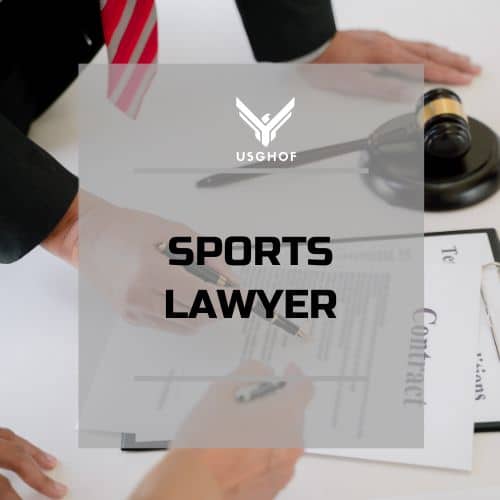A sports lawyer is a legal professional who specializes in sports law and provides legal services to individuals, organizations, and entities involved in the sports industry. Their responsibilities may vary depending on their specific role and the needs of their clients.
Common responsibilities of a sports lawyer

Legal Advice and Counsel
Sports lawyers provide legal advice and guidance to their clients on various matters related to sports. They interpret and apply relevant laws, rules, and regulations to help clients navigate legal issues and make informed decisions. This can include contractual matters, intellectual property rights, governance and compliance, risk management, and more. So it’s quite difficult to become a sports lawyer.
Contract Negotiation and Drafting
Sports lawyers assist clients in negotiating, drafting, and reviewing contracts. This can include player contracts, coaching contracts, sponsorship agreements, endorsement deals, licensing agreements, and other legal documents. Their role is to protect their clients’ interests, ensure clarity and fairness in contractual terms, and help secure favorable outcomes.
Dispute Resolution
Sports lawyers play a significant role in resolving disputes within the sports industry. This may involve negotiation, mediation, arbitration, or, in some cases, litigation. They advocate for their clients’ rights and interests, seek amicable resolutions, and, if necessary, represent their clients in legal proceedings related to contractual disputes, disciplinary matters, anti-doping cases, and other conflicts.
Regulatory Compliance
Sports lawyers help clients navigate the complex regulatory landscape of sports. They ensure compliance with applicable laws, regulations, and governing bodies’ rules and policies. This includes matters related to athlete eligibility, anti-doping regulations, athlete welfare, organizational governance, event management, and more. Sports lawyers work to ensure that their clients operate within legal boundaries and maintain the integrity of the sport.

Intellectual Property Protection
Protecting intellectual property rights is crucial in the sports industry. Sports lawyers assist clients in safeguarding their trademarks, copyrights, and other intellectual property assets. They help with registration, licensing agreements, enforcement of rights, and combating intellectual property infringement.
Athlete Representation
Sports lawyers often represent individual athletes and act as their legal advisors and advocates. They negotiate contracts, protect athletes’ rights, handle endorsement and sponsorship deals, assist with image rights, and provide overall legal support throughout the athlete’s career. Their role is to ensure that athletes are fairly represented and that their interests are protected.
Risk Management and Compliance
Sports lawyers help clients identify and manage legal risks associated with their involvement in sports. They advise on matters related to liability, insurance coverage, risk assessment, and compliance with health and safety regulations. Their aim is to mitigate risks and protect clients from potential legal issues.
It’s important to note that the specific responsibilities of a sports lawyer can vary depending on their clients’ needs, the nature of the sports industry, and the jurisdiction in which they practice.
The Role of a Sports Lawyer in Gymnastics
In the world of gymnastics, where athletes, coaches, and organizations navigate a complex landscape of rules, regulations, and legal considerations, sports lawyers play a crucial role in protecting the rights and interests of those involved. A sports lawyer specializing in gymnastics possesses the expertise to navigate the legal aspects specific to the sport, ensuring compliance, resolving disputes, and advocating for their clients. Let’s explore the role of a sports lawyer in gymnastics:
- Legal Compliance: Gymnastics is governed by various national and international bodies, such as national gymnastics federations, the International Gymnastics Federation (FIG), and the International Olympic Committee (IOC). These organizations establish rules and regulations that govern athlete eligibility, competitions, anti-doping measures, safety protocols, and more. A sports lawyer well-versed in gymnastics law assists athletes, coaches, and gymnastics organizations in understanding and complying with these rules to ensure fair play and adherence to the sport’s standards.
- Contract Negotiation: Sports lawyers in gymnastics play a pivotal role in contract negotiations, representing athletes, coaches, or gymnastics clubs. They review, draft, and negotiate contracts to protect their clients’ interests, including matters related to sponsorship agreements, endorsement deals, coaching contracts, and competition participation contracts. These legal professionals strive to secure favorable terms and protect their clients’ rights, ensuring that all contractual obligations are fair and clear.
- Dispute Resolution: When disputes arise in the gymnastics world, such as disagreements between athletes and their coaches, gymnastics organizations, or other parties involved, sports lawyers step in to provide legal guidance and representation. They help resolve conflicts through negotiation, mediation, or, if necessary, through litigation. Sports lawyers with expertise in gymnastics understand the unique dynamics and challenges within the sport, enabling them to advocate effectively for their clients’ interests and work towards fair and equitable resolutions.
- Athlete Representation: Sports lawyers in gymnastics often serve as advocates for individual gymnasts. They provide legal advice, protect their clients’ rights, and act as a liaison between athletes and various stakeholders, including gymnastics federations, event organizers, sponsors, and regulatory bodies. These lawyers work diligently to ensure that their clients’ voices are heard, their interests are protected, and they receive fair treatment throughout their careers.
- Governance and Compliance: Gymnastics organizations must adhere to legal and ethical standards to maintain the integrity of the sport. Sports lawyers specializing in gymnastics assist gymnastics federations, clubs, and event organizers in establishing governance structures, developing policies and procedures, and ensuring compliance with applicable laws and regulations. They provide legal guidance on matters such as risk management, athlete welfare, child protection, and organizational governance, fostering a safe and ethical environment for gymnastics participation.
In the complex world of gymnastics, a sports lawyer with specific knowledge and experience in the sport plays a vital role in safeguarding the rights and interests of athletes, coaches, and organizations. By navigating the intricate legal landscape, these professionals contribute to the fair and transparent functioning of gymnastics, allowing athletes to focus on their training, competition, and personal development.

